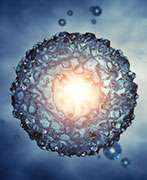(HealthDay)—For women with breast cancer, embryo cryopreservation after aromatase inhibitor treatment and ovarian stimulation preserves fertility, according to a study published online June 22 in the Journal of Clinical Oncology.
Kutluk Oktay, M.D., from New York Medical College in Valhalla, and colleagues provided pregnancy and fertility preservation outcomes for 131 women with breast cancer. Participants underwent ovarian stimulation and received concurrent letrozole 5 mg per day before receiving adjuvant chemotherapy and cryopreserving embryos.
The researchers found that 33 of the women (mean age, 41.5 ± 4.3 years) underwent 40 attempts to transfer embryos to their uterus (18 women) or via use of a gestation carrier (22 women) with a median of 5.25 years after embryo cryopreservation. Per embryo transfer, the overall live birth rate was similar to the U.S. national mean among similar-aged infertile women undergoing in vitro fertilization-embryo transfer (45.0 versus 38.2; P = 0.2). Overall, 38.8 percent of the 18 pregnancies were twins, with no higher-order pregnancies. After a mean follow-up of 40.4 ± 26.4 months, no fetal anomalies or malformations were reported. Seventeen of the 33 women had one or more children, with a fertility preservation rate of 51.5 percent.
"Embryo cryopreservation after ovarian stimulation with the letrozole and follicle-stimulating hormone protocol preserves fertility in women with breast cancer and results in pregnancy rates comparable to those expected in a noncancer population undergoing in vitro fertilization," the authors write.
More information:
Abstract
Full Text (subscription or payment may be required)
Editorial
Journal information: Journal of Clinical Oncology
Copyright © 2015 HealthDay. All rights reserved.




















